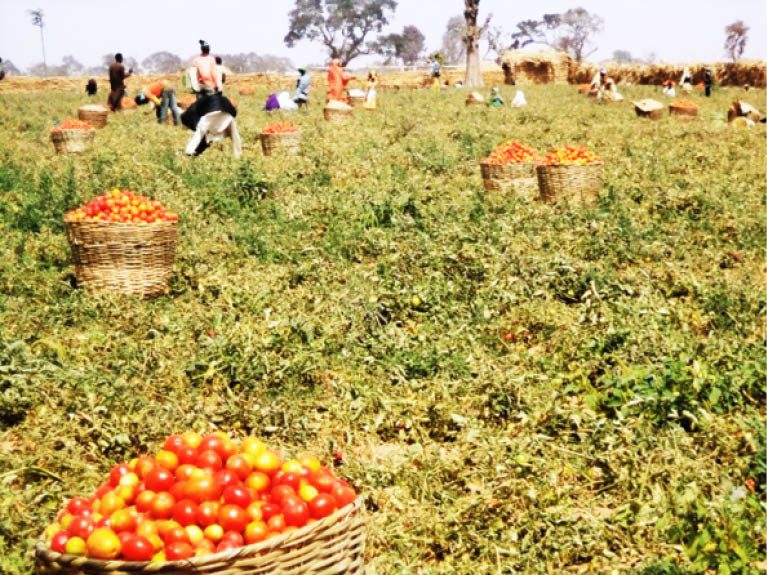In the agricultural sector, this is harvest season, but as the Food and Agriculture Organization (FAO) has projected over the years, Nigeria, on the average, loses $9 billion (about N3.5 trillion) annually to post-harvest waste.
This waste is almost a quarter of the country’s annual budget. Some of the grains, vegetables, tubers and fruits being wasted include tomatoes, orange, cashew, onions, beans, wheat, cassava, and even yam.
- Concerns over fresh electricity tariff hike
- 2023: Igbo leaders demand presidential tickets from APC, PDP
The waste is very painful because of the high cost of production in the country today.
Without government’s support, many farmers bear the cost of labour, fertilizer, herbicides, seeds and seedlings, water pumping machines for irrigation, fuel for the machines, and the value of the land used for farming.
Under this atmosphere, one of the most discouraging occupations in Nigeria today is farming.
While those who should provide leadership in the sector are helplessly watching these produce being wasted, in many serious countries, storage facilities have been provided for different kinds of agricultural produce.
Here, vegetable farmers have to sell their produce at give-away prices in this season because there are no temperature regulated facilities where they could be stored.
Even the country’s silos do not have such facilities, and for the facilities available there is the lack of electricity support for them.
For this reason, it is feared that the country’s 33 silos with a total capacity of 1.3 million metric tonnes of agricultural produce hardly have up to 200,000 metric tonnes worth of grains in them at a time.
Left to their fate, tomato farmers, for instances, have to hurriedly sell off their harvest because even the vehicles used in transporting the vegetable have no cold temperature facility.
Unfortunately, the weather from the end of 2020 and early part of 2021 does not help farmers who depend on its clemency to preserve their produce.
For instance, yam farmers are in a fix at the moment because of the prevailing heat that has made it difficult to preserve their tubers.
Under the traditional system, they would have left their harvest under shades on their farms.
But with banditry and theft as besetting problems, yam farmers have to store their tubers at home where ventilation is a challenge.
It is feared that between 30 per cent and 40 per cent of yam harvest could be lost in the next few months.
Nigeria must learn positive lessons from developed countries.
Countries that take agriculture seriously invest heavily in storage facilities.
That is why Nigeria could import in 2021 grains produced in 2015 and when they are consumed, they are still in relatively good and healthy condition.
Even vegetables are effectively stored in regulated temperature environments, and could be exported to us, simply because the authorities invested in the necessary infrastructure.
The country’s leadership, irrespective of political parties in power, has used agriculture and food security as campaign slogan.
However, Nigeria cannot attain food security when there are no storage facilities.
On its part, the federal government, through the Central Bank of Nigeria (CBN), has given a lot of soft loans to farmers, but that is not enough.
State governments should play their own part in this all-important task of averting post-harvest losses.
As a result of funds being released by the CBN, states have taken interest in ‘political crops’ like rice and maize, and have abandoned vegetable farmers to their fate.
This is totally wrong. State governors must show responsibility by identifying crops in which they have comparative advantage and provide storage facilities for them.
In this era of COVID-19 when many countries are preserving their agricultural produce in the event of another lockdown, it is insensitive for government at all tiers to watch grains, tubers, and vegetables waste away when they could have been preserved for consumption in the near future.
Also, we call on farmers associations to come together and pressurise governments to put in place infrastructure for storage.
At the moment, the Rice Farmers Association of Nigeria (RIFAN) and the Maize Association of Nigeria (MAAN) could play leadership roles.
It is not too late to start. We call on all stakeholders in farming to come together and find a solution to the poor storage culture in Nigeria.

 Join Daily Trust WhatsApp Community For Quick Access To News and Happenings Around You.
Join Daily Trust WhatsApp Community For Quick Access To News and Happenings Around You.



